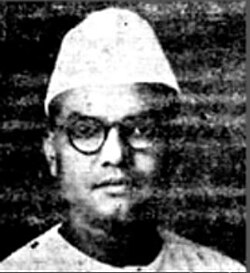Kovai Khadar Ayyamuthu
Kovai Ayyamuthu | |
|---|---|
 | |
| Born | December 1898 |
| Died | 21 December 1975 |
| Nationality | Indian |
Kovai Ayyamuthu (also known as Kovai Kadar Ayyamuthu, December 1898 – 21 December 1975) was a Gandhian, Indian freedom fighter and a writer.[1][2][3]
Life and career[edit]
Ayyamuthu was born in Kangayam region of Tirupur district to Angannan and Marakkal. He was married to Govindammal in the year 1921. Ayyamuthu was an important leader in Sarvodaya Movement. Being a good friend of EVR Periyar, he was mentored by C. Rajagopalachari.
Govindammal actively participated and involved in various agitation and the couple were jailed numerous times. In the year 1924 Kovai Ayyamthu participated in Vaikom Satyagraha.He also played pivotal role in Kadar organisation in the Coimbatore region. After independence Ayyamuthu and Govindammal set up the "Gandhi Pannai" on the Coimbatore Pollachi road. And their house was name as "Rajaji Illam".
References[edit]
- ↑ Govindarajulu, Rajesh (14 August 2014). "A couple of patriots". The Hindu. India: The Hindu. Retrieved 20 March 2020.
- ↑ Thomas, Wilson (1 October 2019). "Mahatma Gandhi's Kovai connect". The Hindu. India: The Hindu. Archived from the original on 27 December 2019. Retrieved 20 March 2020.
- ↑ Swaroop, Vishnu (14 November 2018). "Without museums, war veterans fade into history". The Times of India. India. Archived from the original on 16 November 2018. Retrieved 20 March 2020.
External links[edit]